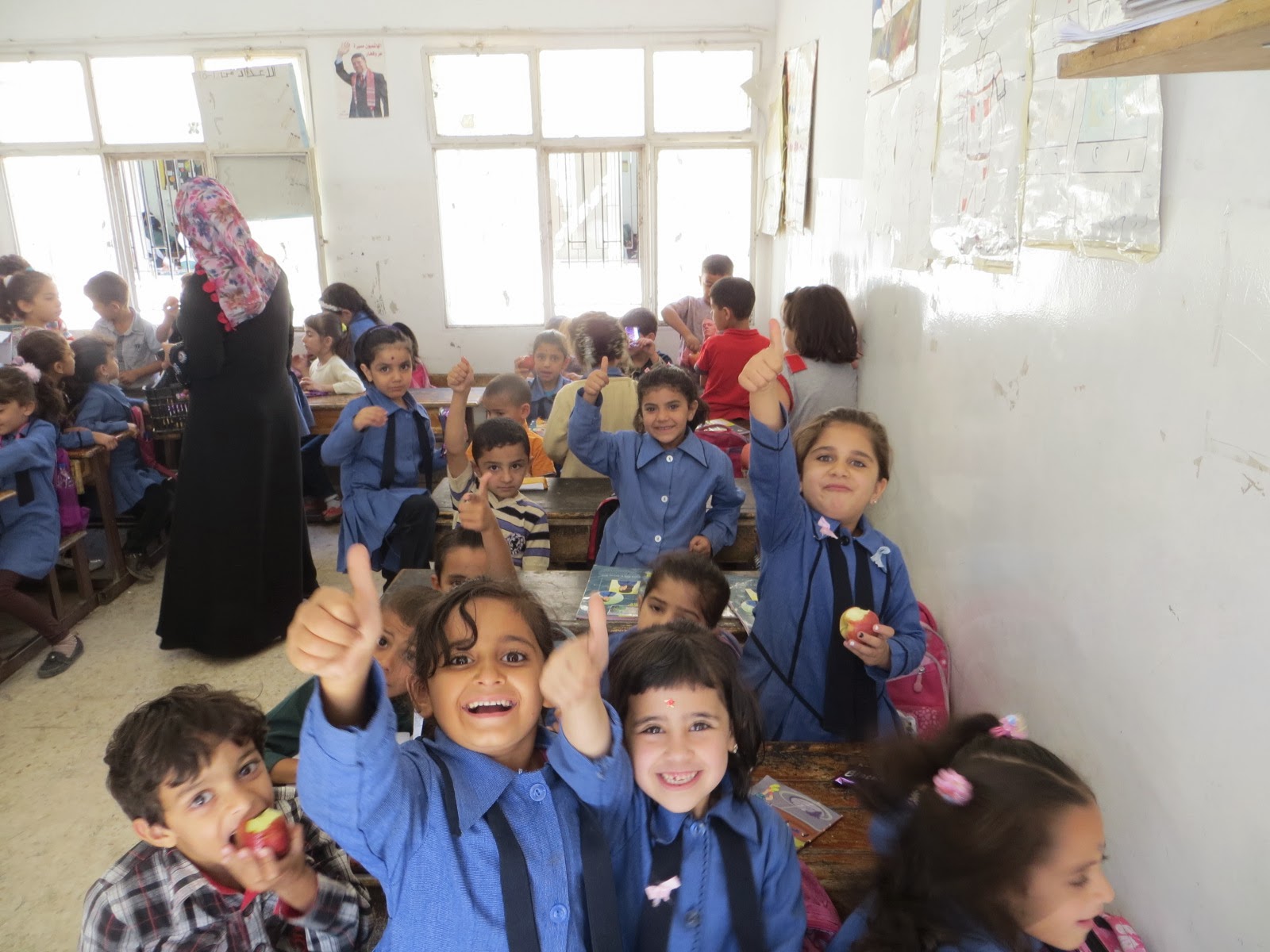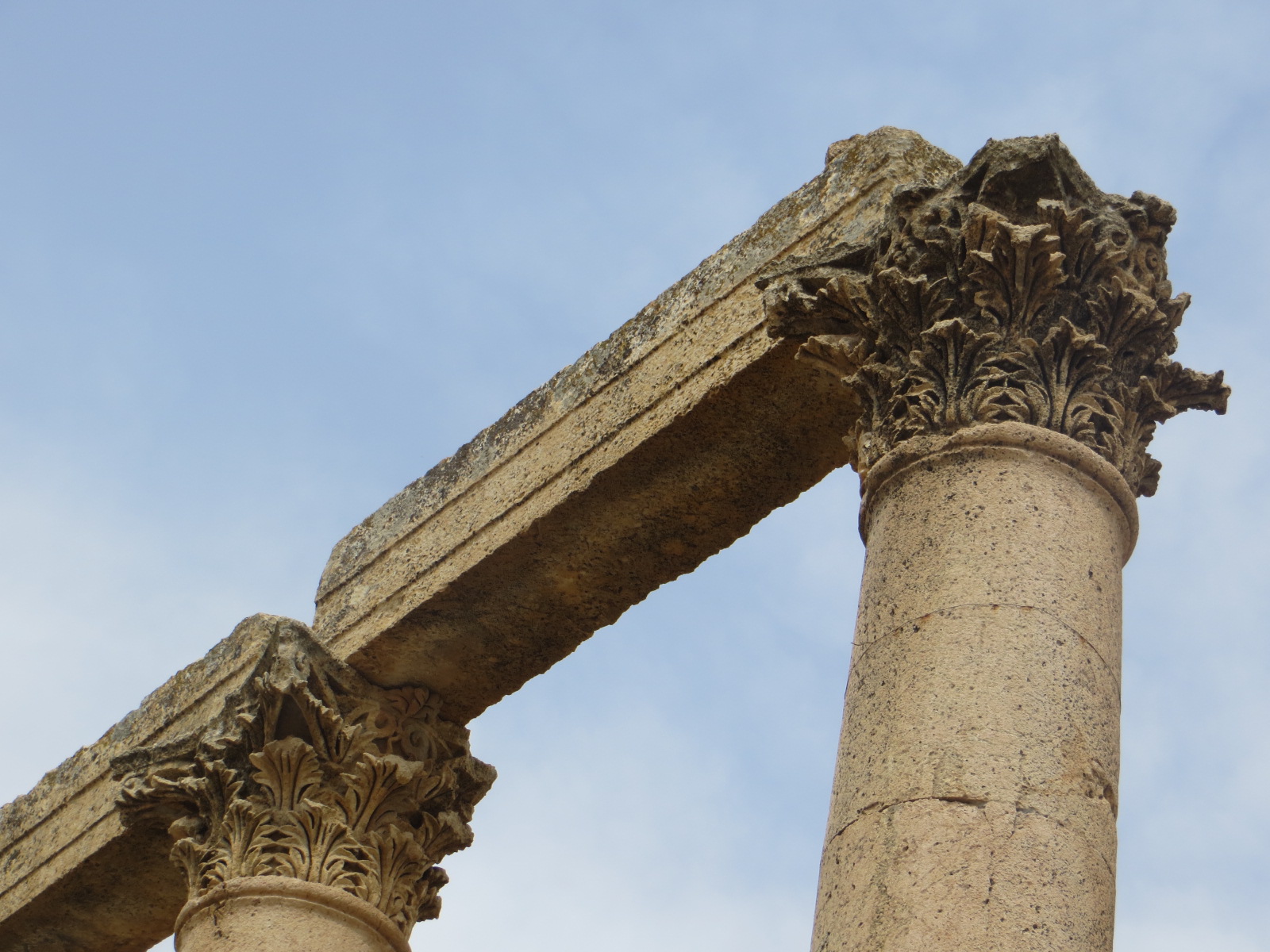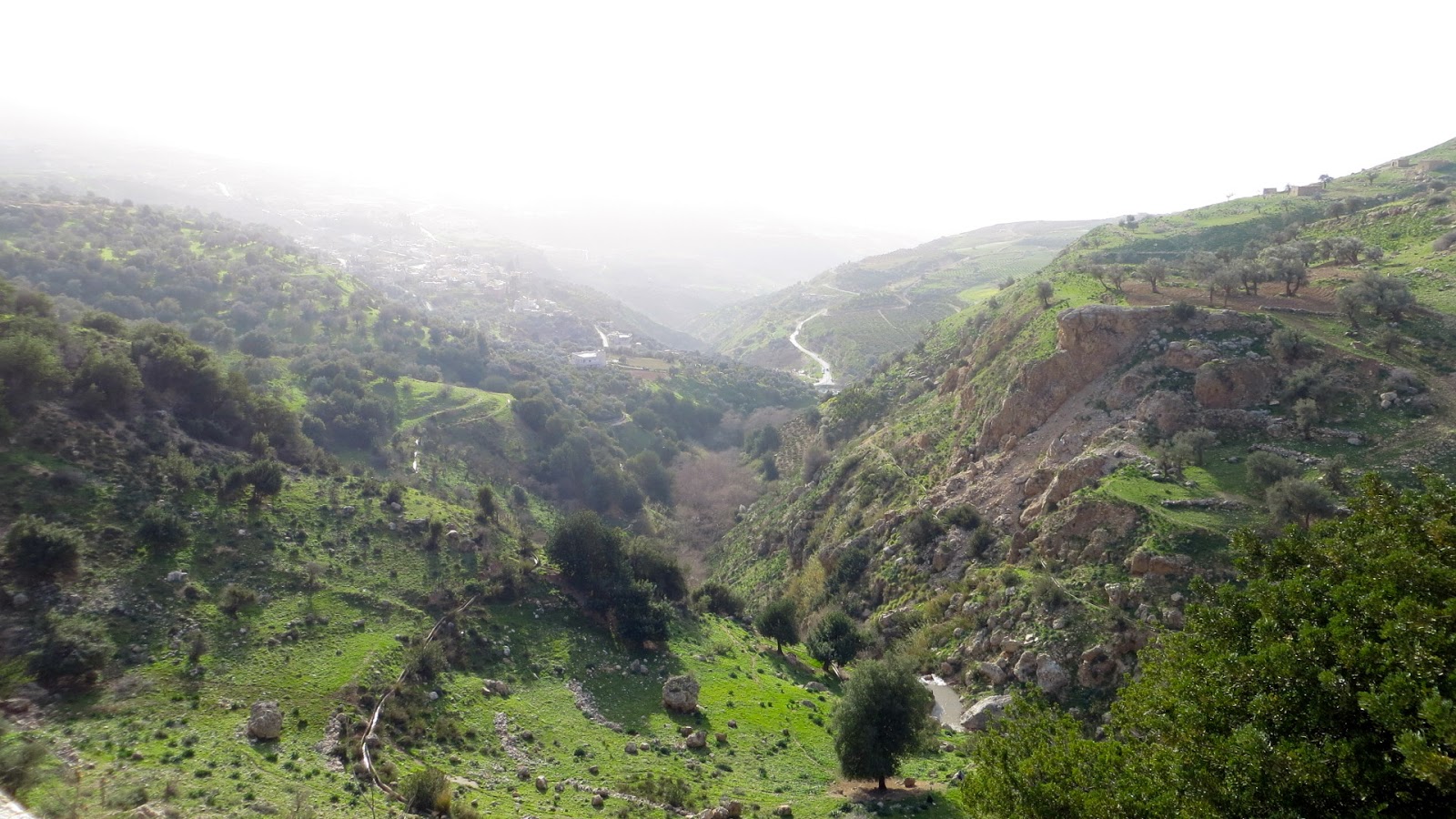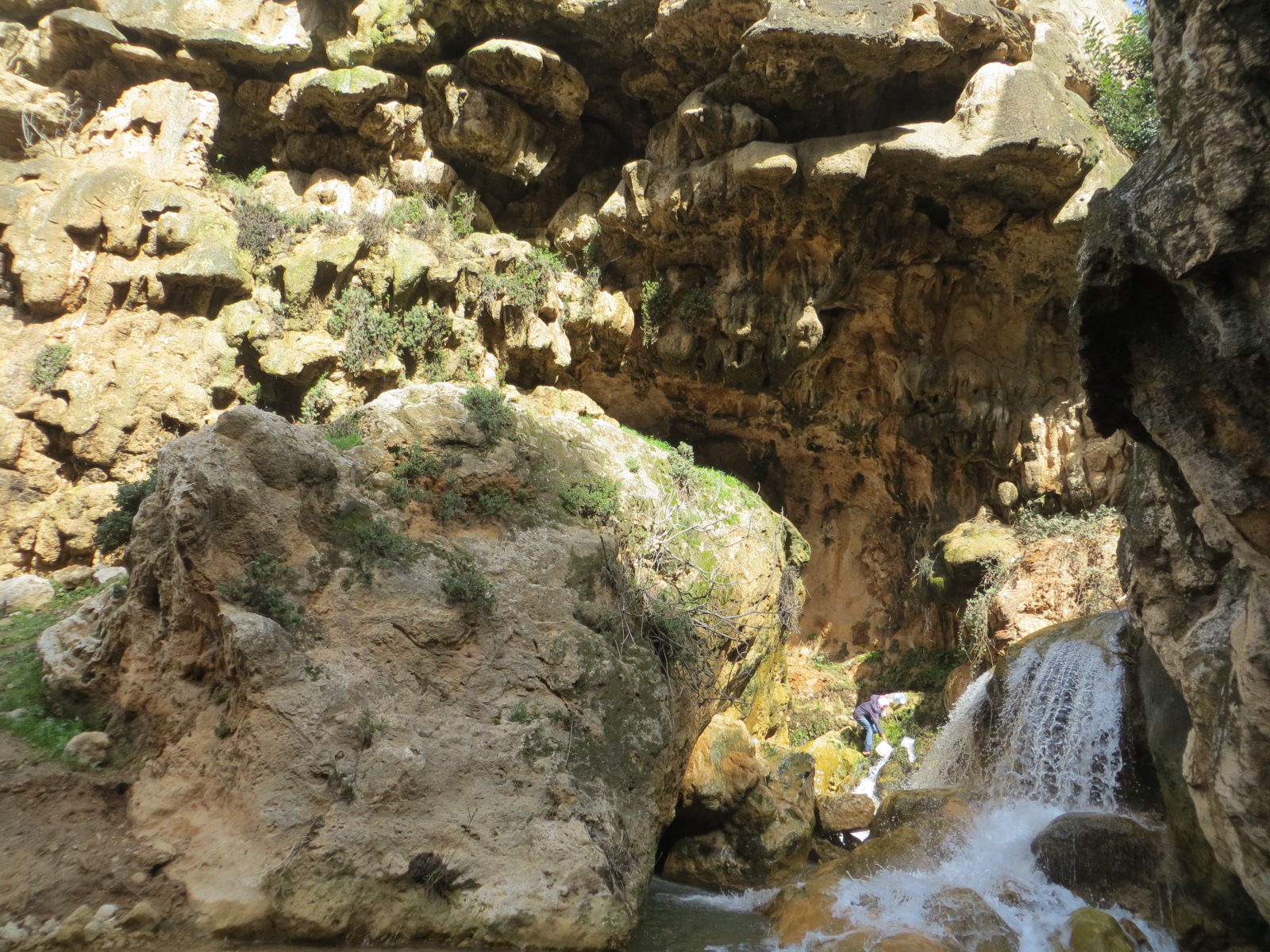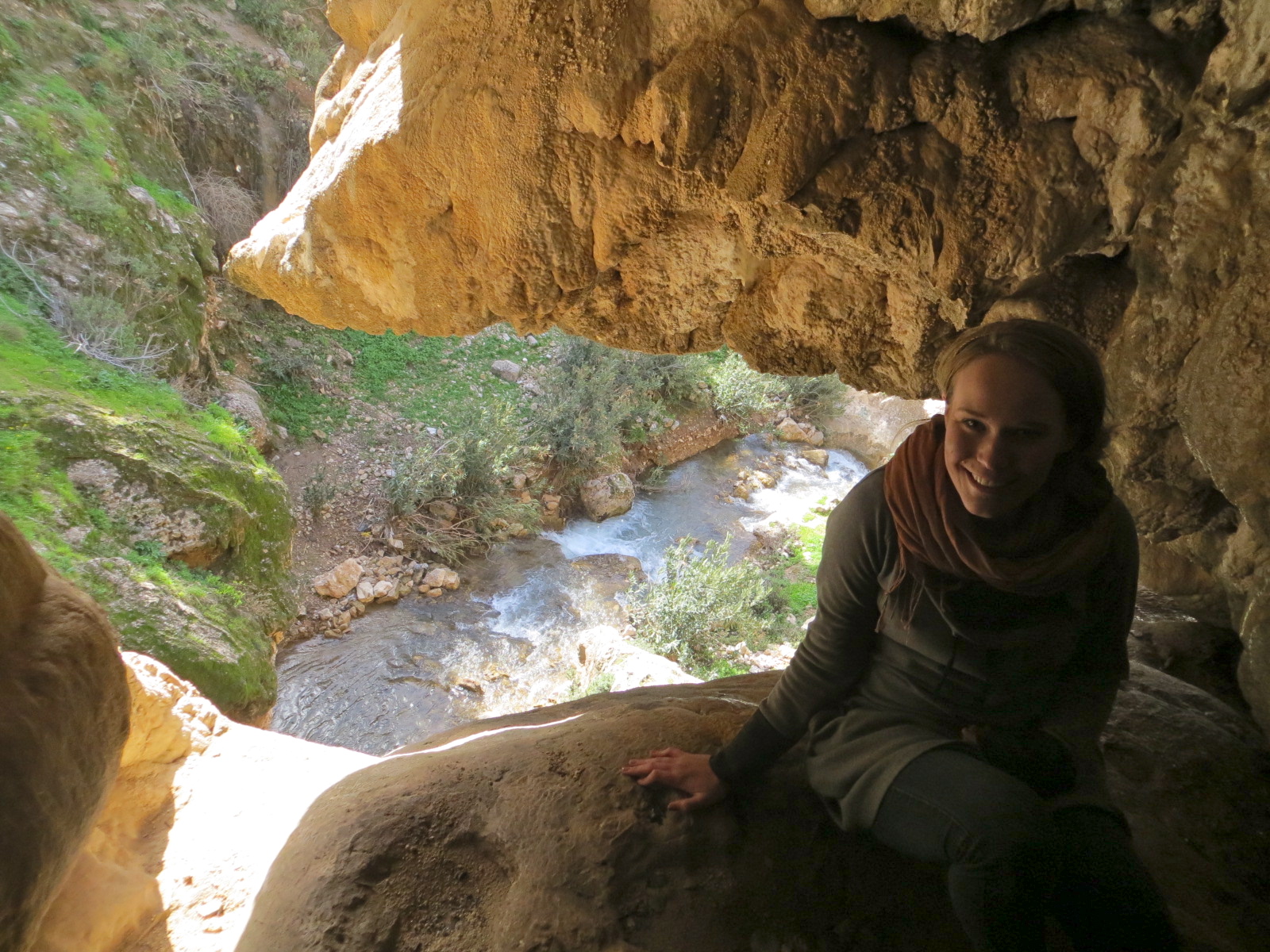I swore in as a Peace Corps Volunteer just about 6 months ago. Since then, I've received emails from family and friends with questions of what life is like as a volunteer, and what it's like to live in Jordan. Also, invitations for new Peace Corps Jordan volunteers are being sent out soon and I remember after receiving mine, rabidly searching the net trying to get a glimpse into what I was getting myself in to. So, during this particularly low-key Friday afternoon, I decided to attempt to answer a few of these, so they can be neatly compiled in one place.
What's an average day like?
The school and work week is Sunday-Thursday and spring semester runs from the beginning of February until early or mid June
. On school days, I get up around 6:30 and walk down to school, past my landlord's pigeons, goats, chickens, and dog, olive trees, grape vines, rose bushes and lemon trees. As soon as I get on to the main road I am usually greeted with "good morning Ms Emily!" by at least a few of my students and continue the walk down the hill to school with them. I work at the girls' basic school and teach grades 1-4. The kindergarten and first grade is co-ed, and the rest of the grades (up to 9th) is all girls. After school I teach English at the local Knowledge Station that is equipped with computers, an overhead projector, and English software. I have taught a variety of classes; a TOEFL prep course, adult beginners, 7th grade, 9th grade, and a couple other levels.
After that, I am often invited over to my landlord's house for lunch. I'll take them up on that, sometimes go visit other neighbors, or nap at my house. I spend my evenings hanging out at my neighbors' house or my own. I do some lesson planning, but after that's done I usually spend my evenings on the internet talking to folks, reading the news, or watching reruns of US sitcoms.
What do you do for fun?
Most weekends, there is something going on - a wedding, an engagement party, an invitation to go on a picnic to someone's farm, and more recently, graduation parties. I visit people a lot. I'm viewed as an adult here so at visits, am expected to sit around and drink tea and coffee and talk for hours with women often twice my age. This can be great for about a half hour and then I try to sneak away to go and play with the kids outside. We play football, pick fruit, play with turtles (!), play with my Iphone and take as many pictures as possible, etc.
Some weekends I will go to Amman, which is only a couple hours away from me and an easy bus ride, and hang out with other volunteers. There's a cheap hotel we can stay at for about $7 a night downtown. There was a big music festival last week that had bands performing from all over the region, including
Mashrou Leila, DAM, and
Alaa Wardi. Click on the links-- seriously! Life in Amman is drastically different than life in most villages. There is a huge ex-pat community, all sorts of restaurants and bars, malls... the works.
Is everyone Muslim? How prevalent is religion?
Sunni Islam is the predominant religion in Jordan. There is also a Christian population (about 8%). Although my town is mostly Muslim, the town closest to me has a large Christian population. Atheism or agnosticism is very rare here, and not well understood. Muslims and Christians work together and are seemingly pretty understanding of one another. My mudeera (principle) is Muslim but my vice-mudeera is Christian. The adhan, or Islamic call to prayer, is an integral part of the culture here and can be heard from every mosque 5 times a day. People will either go the mosques or pray at home or work, facing South towards Mecca. Of course, religious practices vary from place to place, family to family, person to person.
Do women cover their heads?
Many Muslim women do cover their hair when in public, or when in the presence of men who are not close relatives. Some wear a hijab (head scarf)- they come in all sorts of pretty colors and patterns. Some women wear the niqab, a black veil that covers the face except for the eyes. Some Muslim women don't cover their hair at all. The burqa (the black robe that covers the entire body including face and eyes) is rare in this region, but some women do wear it. There is certainly some influence from family members or husbands, but from the women I've talked to about this it seems that how much they choose to cover, or not to cover, is ultimately their personal decision (I'm speaking about Jordan, in countries like Saudi Arabia it is different). As a non-Muslim, I am not expected to cover my hair. I do, however, dress more conservatively than I did in the states. In public, I usually wear my hair tied up and try to wear clothes that cover ankles, wrists and collar bones.
What's the weather like?
I live in the mountains in the North of Jordan. It was cold in the winter, beautiful in the Spring, and now hot in the Summer (in the 80s and 90s). There are tons of fruit trees and pine trees. Right now,
toot are in season- berries similar to raspberries, and
mish-mish (apricots). Grapes will be here in about a month, and figs will be ready by October.
Do you have any friends?
My brother has asked me this more than once. So to make it clear, yes, I have friends. All of the volunteers got quite close during our 2 months of training and I am lucky to live relatively close to quite a few of them. I still am in contact with my host family in Madaba and some of the friends that I made there. I visited them a few weeks ago and will visit again at the end of June. In Kufranjah, I've been blessed with a landlord with a very welcoming, loving family. They have 9 grown kids, the youngest is 17 and the oldest is 27, who recently announced she is pregnant. Mama Haula often refers to my as her 6th daughter. I am invited for lunch most days. I've also become really good friends with one of the teachers at my school. She makes an effort to visit me, invite me to her home, and take me to their beautiful farm about 15km away despite having 7 young kids. I love the students and kiddos in my neighborhood, and naturally make friends with them faster and easier than I do with most adults because our relationship is based off of playing rather than talking. They love inviting me to their homes. On the days that I am not utterly exhausted, I graciously accept.
How are the guys? Is harassment an issue?
As I've alluded to, gender segregation is very prevalent here. At all parties and social gatherings, women are usually upstairs and the men downstairs and they don't interact. My landlord's family has 4 boys and since I am over there all the time, considered part of the family even, I hang out with them and it's fine. But I would never, ever go and spend time there if the girls weren't home. Not because I don't trust them, but because it would be inappropriate and awkward.
Men in the street here are for the most part okay. There is staring and occasional vulgar words thrown in my direction. Public shaming is one of the biggest embarrassments here, so a piercing glare or "haram" (forbidden) will shut them up.
I get asked if I'm married all the time by moms and grandmas in my community. I say no. Then they ask if I will get married to a Jordanian or an American. I usually tell them that I am in Jordan to work and learn, am not ready to get married, and want my parents to know my to-be-husband. This sometimes works, but women still tell me how great their sons are in hopes I might change my mind. On one occasion a woman I'm pretty close with became very persistent in her attempt to get me to marry her son. It got awkward. But stopped.
How is your Arabic?
It's fine, but I get frustrated that I can't express myself fully. I can have conversations with people and get my basic needs, for the most part. On June 15, all volunteers return to villages around Madaba for 2 weeks of intensive Arabic lessons. I'll live with a host family again and have Arabic lessons every day. After this, maybe I won't have to resort to charades and pictionary quite as often,
inshaallah.
Are you homesick?
Rarely- it's the people I miss (who
are scattered all over the place anywho) and the internet makes keeping
in touch with them- and even seeing their faces- pretty easy.
So.... you live in the Middle East...
 |
| I live in the northwest, near Jerash on the map. |
Yes, I live in the Middle East. Globally speaking, Jordan is in a tough neighborhood.
 |
| From Al Jazeera's homepage |
However, I feel completely safe in my village, on the buses to other villages, and in Amman. But the fact that there is a war going on about 75km North of me is something I think of tirelessly. It's Atrocious. Horrendous. I'm not sure if there is a word strong enough to express it.
Final death toll for Thursday 06/06/2013; More than 140 were killed in Syria yesterday. The dead include: 44 civilians, 52 rebel fighters, 2 defected
soldiers (1 officer), 11 unidentified rebel fighters, and at least 35
regular soldiers. -- Syrian Observatory for Human Rights.
About 1500 Syrians are coming to Jordan every day. There are well over half a million refugees living in Jordan, some
in the refugee camps but a lot in villages throughout the North of
Jordan. I was talking to a friend the other day and she thinks there are
at least 500 Syrian families living in our village. Some Jordanians here "rent out"
their roofs to Syrian families. The effect
that this influx of people has on Jordan is intensifying more each day. Despite the foreign aid
Jordan is receiving, prices continue to rise. Today, there were many
protests throughout the country because of a recent spike in electricity
prices.
I routinely look at the news, often multiple times a day, in hope that
I'll stumble upon some indication that things will begin to settle down
soon.
Peace talks are being discussed, foreign aid is being sent over-- steps
in the right direction I guess. The optimist in me thinks that these actually can make a significant difference. But the sad reality is that things
aren't going to get better soon. Certainly not overnight.
There are certain places that Peace Corps does not let us go within Jordan. One is anywhere near the Syrian border, including the Zatari refuge camp where 120,000 some Syrian refugees are living. Another is Ma'an, in the South of Jordan where there has been ongoing violence between two tribes that has escalated these past several months. Peace Corps sends us weekly emails highlighting all local and regional news. When there are any security concerns we get text messages letting us know what is going on and we've been trained multiple times on what to do if something were to suddenly occur that would threaten our safety.
Most countries in the region are off limits to travel to as well: Egypt, Syria, Lebanon, Palestine, Iraq, Iran and now Turkey. I had made summer plans to travel to Istanbul, but have to cancel or alter plans now for
obvious reasons.
I have these 2 quotes taped on my wall side by side each other and my giant world map.
“Adventure is a path. Real adventure – self-determined, self-motivated, often risky – forces you to have firsthand encounters with the world. The world the way it is, not the way you imagine it. Your body will collide with the earth and you will bear witness. In this way you will be compelled to grapple with the limitless kindness and bottomless cruelty of humankind.... This will change you. Nothing will ever again be black-and-white.” – Mark Jenkins
"It takes a great deal of courage to see the world in all its tainted glory, and still to love it." -– Oscar Wilde
And I leave you with that. If you have any other questions, please leave them in the comments or email me.


